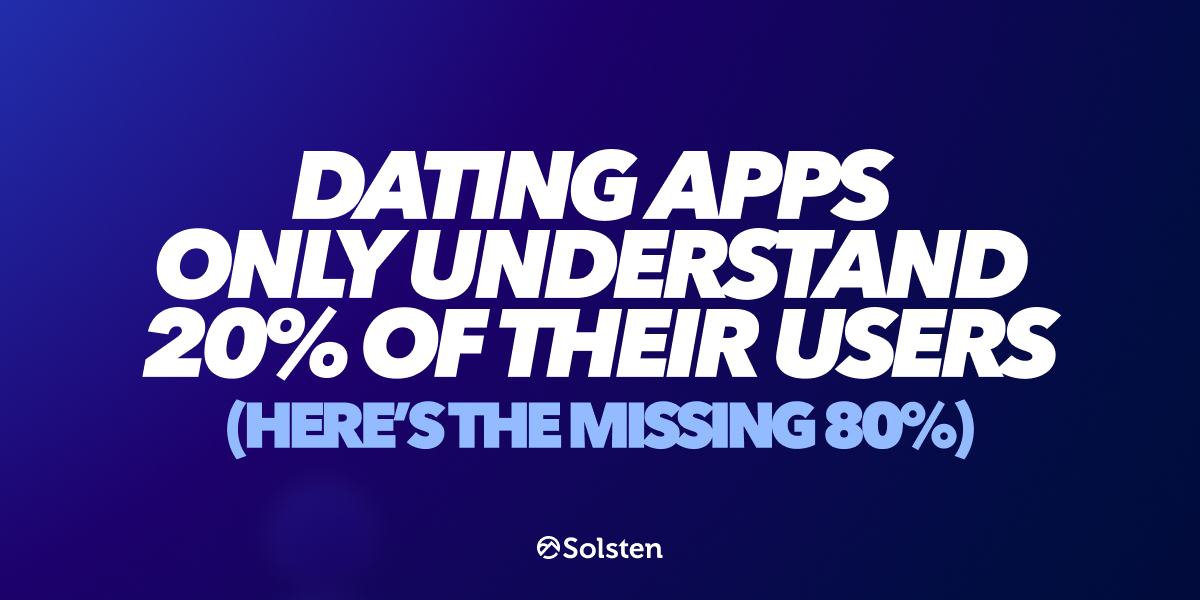After analyzing psychological profiles of 8,617 dating app users globally, we found that dating platforms only truly understand about 20% of their audience, which is the segment that fits their narrow “young singles looking for love” assumption.
The other 80%? They’re four distinct psychological segments with completely unique motivations, triggers, and needs. Dating apps are spending billions trying to acquire these people, only to watch them disappear within weeks.
This massive blind spot explains why customer acquisition costs have exploded by 200% over the past decade, rising to $29 per user. A recent AppsFlyer survey reveals that 65% of dating apps are uninstalled within a month, with 90% of those deletions occurring within the first week. When you’re only designing for one-fifth of your actual audience, the other four-fifths will inevitably leave.
Using scientifically validated personality assessments with clinical-grade reliability, we’ve identified the five hidden psychological segments that make up the dating app universe, and why understanding them could unlock a $12 billion market opportunity.
The Science Behind the Segments
Our analysis draws from psychological profiles of 8,617 individuals representing a global dating audience of 320 million people. Using our psychological AI tool, Elaris, we’ve identified five distinct psychological segments that explain why traditional dating app marketing fails. This is based on scientifically validated personality assessments measuring traits across neuroticism, extraversion, openness, conscientiousness, and agreeableness, combined with motivational drivers for autonomy, achievement, mastery, and purpose.
Each segment shows statistically significant differences in personality traits (measured at the percentile level), values, and behavioral drivers. The methodology achieves clinical-grade reliability with alpha values ranging from 0.7 to 0.95, ensuring these insights reflect genuine psychological differences rather than random variation.
Want to explore the complete psychological profiles for your specific audience? Access the same data powering this analysis with Elaris for free.
The Five Hidden Audiences in Your Dating App
The Passionate Trendsetter (38% of dating audience)
Market Size: 120 million people globally
Psychological Profile:
- High neuroticism (68th percentile): Emotionally intense and sensitive to rejection
- High self-esteem (69th percentile): Confident and self-assured in social situations
- High transformation values (68th percentile): Constantly seeking growth and new experiences
What Drives Them: Passionate Trendsetters crave excitement, recognition, and emotional highs. They want to feel desired, admired, and part of exclusive experiences. Status and social validation drive their engagement more than practical outcomes.
Strategic Applications:
Content Strategy: High-energy, visually stimulating content performs significantly better with this segment. Use bold visuals, trending challenges, and exclusive previews. Content featuring “VIP experiences” or “most liked profiles” drives immediate engagement. Focus on Netflix (61% preference), Instagram (27% preference), and Spotify (37% preference) for maximum reach.
Product Strategy: Prioritize features that signal status and exclusivity. Premium badges, early access to new features, and social proof elements (like displaying match popularity) resonate strongly. Tinder’s “Top Picks” feature succeeds because it appeals to this segment’s desire for quality and status.
Marketing Strategy: Leverage FOMO and exclusivity in messaging. “Don’t miss your chance to connect with the most interesting people” resonates more than generic “find love” messaging. Influencer partnerships and trending content amplify effectiveness.
The Skeptical Individualist (38% of dating audience)
Market Size: 120 million people globally
Psychological Profile:
- Low agreeableness (23rd percentile): Direct, values logic over emotional appeals
- High survival values (73rd percentile): Security-focused and plans ahead
- High self-esteem (64th percentile): Confident and self-reliant
What Drives Them: Skeptical Individualists prioritize autonomy, transparency, and practical value. They resist pressure, dislike hype, and quickly abandon platforms that feel manipulative. They want straightforward connections without emotional drama or commitment pressure.
Strategic Applications:
Content Strategy: Direct, fact-based content with clear value propositions. “How-to” guides and honest platform comparisons perform better than emotional appeals. Avoid fluffy language—this segment responds to bullet points and practical benefits. Target Amazon Prime (37% preference) and Reddit communities for honest, peer-driven advice.
Product Strategy: Emphasize user control and transparency. Features like granular privacy settings, clear pricing with no hidden fees, and “pay-as-you-go” options align with their autonomy needs. Coffee Meets Bagel’s daily curated matches succeed because they reduce decision fatigue while maintaining user control.
Marketing Strategy: Lead with transparency and practical benefits. “No games, just real connections” resonates more than romantic messaging. Highlight autonomy: “Connect on your terms” and “Cancel anytime, no questions asked” drive higher conversion rates.
The Sensitive Altruist (12% of dating audience)
Market Size: 37 million people globally
Psychological Profile:
- Very high agreeableness (81st percentile): Deeply empathetic and avoids conflict
- High mastery motivation (75th percentile): Strong drive for self-improvement
- High purpose values (64th percentile): Seeks meaning and positive impact
What Drives Them: Sensitive Altruists seek genuine emotional connection, safety, and meaningful relationships. They’re motivated by kindness, empathy, and the opportunity to help others grow. Surface-level interactions and aggressive marketing repel this segment.
Strategic Applications:
Content Strategy: Warm, supportive content emphasizing emotional safety and genuine connection. Success stories focusing on personal growth and meaningful relationships drive higher engagement than casual dating content. Netflix (67% preference) and Facebook (34% preference) provide ideal platforms for community-focused content.
Product Strategy: Build features that foster trust and emotional safety. Comprehensive profile verification, community support features, and wellness content integration. eHarmony’s compatibility matching succeeds because it promises deeper connection over quick matches.
Marketing Strategy: Emphasize safety, values alignment, and meaningful outcomes. “Find someone who truly understands you” outperforms “hot singles in your area” messaging. Highlight community support and ethical practices. Partner with wellness podcasts and mental health platforms for authentic endorsements.
The Confident Socializer (8% of dating audience)
Market Size: 24 million people globally
Psychological Profile:
- High extraversion (62nd percentile): Energized by social interaction
- High transformation values (75th percentile): Embraces growth and change
- High internal cohesion (66th percentile): Values group harmony and belonging
What Drives Them: Confident Socializers thrive on group energy, shared experiences, and social belonging. They want dating to be fun, interactive, and community-oriented rather than one-on-one focused.
Strategic Applications:
Content Strategy: Interactive, group-oriented content with participation elements. Live events, group challenges, and “tag a friend” campaigns drive higher engagement. Social proof through community features amplifies effectiveness. Leverage Netflix (66% preference) for social viewing features and Facebook (34% preference) for event integration.
Product Strategy: Develop group dating features, event integration, and social networking elements. Bumble’s friend-finding feature (Bumble BFF) and event partnerships succeed because they address this segment’s need for community and shared experiences.
Marketing Strategy: Focus on fun, belonging, and group experiences. “Join the party” and “meet your crew” messaging outperforms individual-focused campaigns. Emphasize event access and social opportunities.
The Risk-Averse Improviser (7% of dating audience)
Market Size: 21 million people globally
Psychological Profile:
- High neuroticism (70th percentile): Emotionally sensitive and prone to stress
- Low self-esteem (22nd percentile): Prone to self-doubt and needs reassurance
- High agreeableness (70th percentile): Empathetic and conflict-avoidant
What Drives Them: Risk-Averse Improvisers need comfort, clarity, and emotional support. They want gentle guidance, low-pressure interactions, and the ability to move at their own pace. Aggressive marketing or fast-paced features increase their anxiety.
Strategic Applications:
Content Strategy: Gentle, reassuring content with step-by-step guidance. “Dating tips for introverts” and anxiety-reducing advice drive higher engagement. Educational content about building confidence performs exceptionally well. Focus on Netflix (67% preference) for gentle, educational content and mental health apps for partnership opportunities.
Product Strategy: Create guided onboarding, support resources, and “safe space” features. Options to pause, slow down, or get help at any stage. Hinge’s detailed prompts succeed because they reduce the pressure of creating engaging profiles from scratch.
Marketing Strategy: Emphasize safety, support, and no-pressure experiences. “Take your time” and “we’re here to help” messaging resonates strongly. Highlight features that reduce anxiety and provide emotional support.
Psychological Analysis of How Current Dating Apps Miss the Mark
Our research reveals massive misalignment between current dating platforms and user psychology, explaining why customer acquisition costs continue to rise while retention remains poor.
Tinder’s Psychological Blindspots:
- Passionate Trendsetters (38%): Well-served by excitement and social proof, but lacks authentic self-expression beyond photos
- Skeptical Individualists (38%): Completely misaligned. Tinder’s gamification and upselling feels manipulative to this transparency-focused segment
- Sensitive Altruists (12%): Poorly served. Fast-paced, appearance-driven approach conflicts with their need for emotional safety
- Risk-Averse Improvisers (7%): Major mismatch. Tinder’s “put yourself out there” energy increases anxiety for this comfort-seeking segment
Bumble’s Mixed Success:
- Stronger alignment with Sensitive Altruists through safety messaging and “women first” approach
- Appeals to Confident Socializers via community features (Bumble BFF, events)
- Still misses Skeptical Individualists who resist social pressure and want more autonomy
- Doesn’t address Risk-Averse Improvisers’ need for guided, low-pressure experiences
Hinge’s Positioning Gaps:
- Best for Sensitive Altruists seeking meaningful connection, but “designed to be deleted” messaging pressures Skeptical Individualists
- Detailed prompts help Risk-Averse Improvisers, but lacks enough anxiety-reducing support features
- Too serious and subdued for Passionate Trendsetters seeking excitement and status
- Missing group features that would appeal to Confident Socializers
The Result: No platform serves all segments effectively, creating constant user migration between apps and explaining the industry’s retention crisis.
The $12 Billion Opportunity: Underserved Segments
Two massive segments remain largely underserved by current dating platforms, representing a combined market of 141 million people globally:
The Skeptical Individualist Gap (120 million people)
Current dating apps focus on emotional engagement, social proof, and subscription models, which is exactly what this segment dislikes. They want transparency, control, and practical value. A platform offering clear, upfront pricing, granular privacy controls, and “no-pressure” matching could capture significant market share from this underserved audience.
Opportunity Strategy: Position as the “anti-dating app,” with straightforward, honest, and user-controlled features. Emphasize “pay as you go” pricing, complete transparency, and respect for user autonomy.
The Risk-Averse Improviser Opportunity (21 million people)
This segment needs guided, supportive dating experiences but faces platforms designed for confidence and speed. They represent an entirely unaddressed market seeking gentle onboarding, anxiety-reducing features, and emotional support.
Opportunity Strategy: Create a “dating for introverts” platform emphasizing comfort, guidance, and emotional safety. Focus on slow, supported matching with comprehensive help resources.
The Competitive Advantage of Psychological Understanding
Dating apps that embrace psychological segmentation gain three critical advantages over demographic-focused competitors:
Precision Targeting: Instead of broad “young singles” campaigns, psychological segments enable laser-focused messaging that can significantly improve conversion rates and reduce customer acquisition costs.
Feature Differentiation: Understanding psychological drivers reveals feature opportunities competitors miss entirely, like anxiety-reducing tools for Risk-Averse Improvisers or community features for Confident Socializers.
Retention Revolution: When features and messaging align with core psychological needs, user retention increases dramatically. This is critical in an industry where mobile apps generally lose 90% of users within 30 days.
Want learn how to deeply understand your target audience? Check out our step-by-step tutorial and start turning insights into action today.
From Misunderstanding to Market Dominance
The dating app industry has been operating on a misunderstanding, treating their diverse user base as a single demographic when they’re actually five distinct psychological segments. This 20/80 problem explains why acquisition costs have surged while retention plummets.
The platforms that recognize this psychological reality first will capture the $12 billion opportunity hiding in plain sight, building features that serve all five segments while competitors continue hemorrhaging the 80% of users they never understood.
Want to discover the psychological segments driving your own audience? The same analysis powering this research is available right now through Elaris, because understanding your users’ psychology isn’t just good business, it’s the difference between sustainable growth and watching your customers disappear into competitors’ apps.






